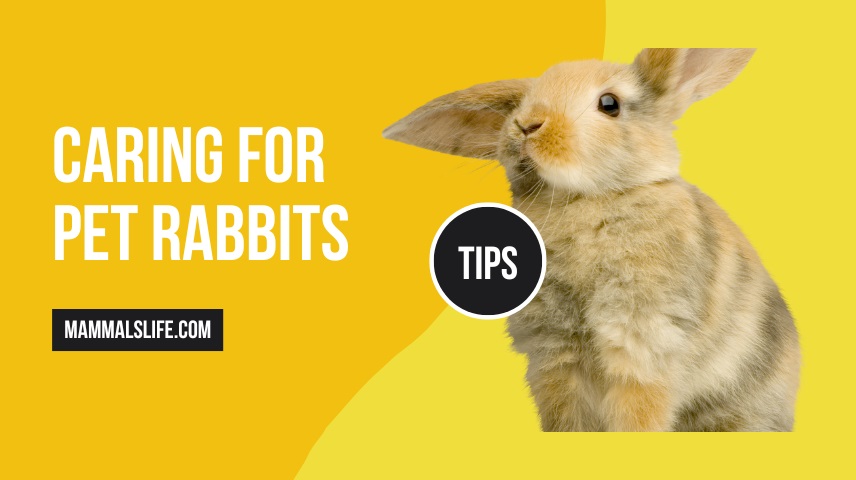Last Updated on February 22, 2025 by Mammals Life
Rabbits need a balanced diet, safe housing, and regular exercise. They also require social interaction and routine veterinary care.
Pet rabbits can be delightful companions, but they require special care. Understanding their needs ensures a happy, healthy life for your furry friend. Providing a nutritious diet rich in hay, fresh vegetables, and quality pellets is crucial. Safe housing, both indoors and outdoors, protects them from predators and harsh weather.
Rabbits are social animals, needing daily interaction to thrive. Regular exercise helps maintain their physical and mental health. Routine veterinary check-ups are essential to prevent common health issues. With proper care, your rabbit can enjoy a long, joyful life, bringing endless joy to your home.
Choosing The Right Rabbit Breed
Choosing the right rabbit breed is crucial for first-time owners. Different breeds have distinct traits. Understanding these traits helps in making an informed decision.
Size And Temperament
Rabbits come in various sizes. Some are tiny, while others are large. Size impacts their care and space needs.
Small breeds like the Netherland Dwarf are cute and easy to handle. They often have a lively nature. Small breeds need less space but can be more delicate.
Medium breeds such as the Mini Lop are friendly and social. They are a good choice for families. Medium breeds balance size and ease of care.
Large breeds like the Flemish Giant require more space. They are often calm and gentle. Large breeds need sturdy housing and more food.
Activity Levels
Rabbits have different energy levels. Knowing their activity level helps in providing the right environment.
High-energy breeds such as the Holland Lop need more playtime. They enjoy exploring and need toys. High-energy rabbits thrive with lots of interaction.
Moderate-energy breeds like the English Angora are playful but also enjoy resting. They need a balance of play and relaxation. Moderate-energy rabbits suit most homes.
Low-energy breeds such as the French Lop are laid-back. They prefer lounging and gentle activities. Low-energy rabbits are ideal for quiet households.
Creating A Comfortable Habitat
Every pet rabbit deserves a cozy and safe home. A well-designed habitat keeps your rabbit healthy and happy. Below, we’ll explore how to create the perfect environment for your new bunny friend.
Indoor Vs Outdoor Housing
Choosing between indoor and outdoor housing is important. Indoor habitats keep your rabbit safe from predators and weather changes. They also allow you to interact more with your pet.
Outdoor housing offers more space for your rabbit to play. Ensure the outdoor space is secure and predator-proof. Use sturdy materials for the enclosure to keep your rabbit safe.
| Indoor Housing | Outdoor Housing |
|---|---|
| Safe from predators | More space to play |
| Stable temperature | Natural sunlight |
| Closer interaction | Fresh air |
Essential Accessories
Adding the right accessories makes your rabbit’s habitat more comfortable. Here are some must-haves:
- Litter box: Helps keep the habitat clean.
- Water bottle: Provides fresh water at all times.
- Hay feeder: Keeps hay clean and accessible.
- Toys: Keeps your rabbit entertained and active.
Make sure the habitat has soft bedding. This provides comfort and warmth for your rabbit. Use rabbit-safe materials like straw or paper-based bedding.
Placing hiding spots around the habitat gives your rabbit a sense of security. Use tunnels, boxes, or small houses.
Finally, ensure proper ventilation. Fresh air prevents respiratory issues and keeps your rabbit healthy.
Proper Nutrition And Diet
Proper nutrition is crucial for your pet rabbit’s health and happiness. Understanding their diet ensures they live a long and joyful life.
Fresh Vegetables
Rabbits love fresh vegetables. These should be part of their daily diet. Fresh veggies provide essential vitamins and minerals.
- Leafy greens like romaine lettuce, kale, and spinach are ideal.
- Herbs such as parsley, cilantro, and basil add flavor.
- Root vegetables like carrots should be given in moderation.
Wash all vegetables thoroughly before serving. Introduce new veggies slowly to avoid stomach issues.
Pellets And Hay
Pellets and hay form the bulk of a rabbit’s diet. They provide necessary nutrients and help with digestion.
| Food Type | Benefits |
|---|---|
| Pellets | Offer balanced nutrition. Choose high-fiber, low-protein options. |
| Hay | Essential for dental health. Timothy hay is a popular choice. |
Ensure constant access to fresh hay. Pellets should be given in measured amounts.
By providing fresh vegetables, quality pellets, and hay, your rabbit will thrive.
Routine Health Care
Caring for pet rabbits involves more than just feeding and playing. Routine health care is essential to keep your furry friend happy and healthy. Here’s how you can ensure your rabbit stays in top shape.
Regular Vet Visits
Regular vet visits are crucial for your rabbit’s health. Schedule check-ups every 6 to 12 months. A vet can spot health issues early. Early treatment can save your rabbit’s life.
During the visit, the vet will check your rabbit’s teeth, eyes, ears, and weight. They will also examine the fur and skin for any signs of problems. Ensure your vet is experienced with rabbits.
Common Health Issues
Rabbits can suffer from various health issues. Knowing the common ones helps in early detection and treatment.
| Health Issue | Symptoms | Prevention/Treatment |
|---|---|---|
| Dental Problems | Drooling, loss of appetite, grinding teeth | Provide chew toys, regular vet checks |
| GI Stasis | Loss of appetite, lethargy, small or no droppings | High-fiber diet, immediate vet care |
| Respiratory Infections | Runny nose, sneezing, labored breathing | Clean environment, avoid drafts, vet care |
| Parasites | Itching, hair loss, visible mites or fleas | Regular grooming, vet-recommended treatments |
- Watch for changes in eating or bathroom habits.
- Keep your rabbit’s environment clean to prevent infections.
- Provide a balanced diet to ensure good health.
Socialization And Exercise
Rabbits are social creatures that need regular interaction and physical activity. Ensuring they get enough exercise and socialization keeps them healthy and happy. Below are some essential tips for bonding with your rabbit and providing safe playtime activities.
Bonding With Your Rabbit
Bonding with your rabbit builds trust and a strong relationship. Spend time sitting quietly near your rabbit. Let them come to you. Offer treats from your hand to encourage closeness.
- Speak softly and gently stroke their fur.
- Play with toys together to build trust.
- Respect their space and avoid sudden movements.
Patience is key. Some rabbits take longer to trust humans. Provide a calm and safe environment for bonding.
Safe Playtime Activities
Rabbits need daily exercise to stay healthy. Create a safe play area where they can hop and explore. Use a pen or a rabbit-proof room for playtime.
| Activity | Description |
|---|---|
| Obstacle Course | Set up tunnels and ramps for them to navigate. |
| Toy Rotation | Provide different toys to keep them engaged. |
| Interactive Games | Play hide-and-seek with treats. |
Always supervise playtime to ensure your rabbit’s safety. Avoid letting them chew on hazardous items.
Frequently Asked Questions
What Do First-Time Bunny Owners Need?
First-time bunny owners need a spacious cage, quality hay, fresh vegetables, a water bottle, chew toys, and a litter box. Regular vet check-ups are essential.
How To Take Care Of Rabbits For Beginners?
Provide fresh hay, clean water, and a balanced diet daily. Ensure a spacious, safe, and clean living area. Offer toys for mental stimulation. Regularly groom and check for health issues. Schedule annual vet visits.
How Long Does It Take A Rabbit To Adjust To A New Home?
A rabbit typically takes about a week to adjust to a new home. Patience and gentle handling help ease the transition.
What To Do When You First Get A Rabbit?
Set up a spacious, safe enclosure. Provide fresh hay, water, and rabbit pellets. Schedule a vet check-up. Offer toys and enrichment. Socialize gently and regularly.
How Often Should I Feed My Rabbit?
Rabbits should be fed twice daily, with fresh hay available at all times.
What Type Of Bedding Is Best For Rabbits?
Soft, absorbent bedding like paper-based products or aspen shavings is ideal for rabbits.
Conclusion
Caring for pet rabbits requires dedication and knowledge. Provide a balanced diet, a safe environment, and regular veterinary care. Social interaction and mental stimulation are also essential. These tips ensure a happy, healthy rabbit. Embrace the joy of rabbit ownership with confidence and compassion.
Enjoy the rewarding experience of being a responsible rabbit owner.








